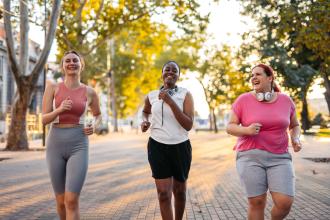Fifteen minutes of exercise creates optimal brain state for mastering new motor skills
A recent study in NeuroImage demonstrates that exercise performed immediately after practising a new motor skill improves its long-term retention. The research shows, for the first time, that as little as a single 15-minute bout of cardiovascular exercise increases brain connectivity and efficiency. It’s a discovery that could accelerate recovery of motor skills in patients who have suffered a stroke or who face mobility problems following an injury.
To find out what was going on in the brain as the mind and the muscles interacted, the research team asked study participants to perform two different tasks. The first, known as a pinch task, consists of gripping an object akin to a gamer’s joystick (and known as a “dynamometer”) and using varying degrees of force to move a cursor up and down to connect red rectangles on a computer screen as quickly as possible. The task was chosen because it involved participants in motor learning as they sought to modulate the force with which they gripped the dynamometer to move the cursor around the screen. This was then followed by 15 minutes of exercise or rest.
Participants were then asked to repeat an abridged version of this task, known as a handgrip task, at intervals of 30, 60, and 90 minutes, after exercise or rest, while the researchers assessed their level of brain activity. This task involved participants simply repeatedly gripping the dynamometer for a few seconds with a similar degree of force to what they used to reach some of the target rectangles in the pinch task. The final step in the study involved participants in both groups repeating the pinch task 8 and then 24 hours after initially performing it, allowing the researchers to capture and compare brain activity and connectivity as the motor memories were consolidated.
Researchers discovered that those who had exercised were consistently able to repeat the pinch task, connecting different areas of the brain more efficiently and with less brain activity than those who hadn’t exercised. The reduction of brain activity in the exercise group was also correlated with a better retention of the motor skill 24 hours after motor practice. This suggests that even a short bout of intense exercise can create an optimal brain state during the consolidation of motor memory, which improves the retention of motor skills.
When they looked more specifically at what was going on, the researchers discovered that, after exercise, there was less brain activity, most likely because the neural connections both between and within the brain hemispheres had become more efficient.
What researchers found especially intriguing was that when they tested participants at the 8-hour mark, there was little difference between groups in skill retention. Both groups were less able to retain the skills they had newly acquired than they were at the 24-hour mark, when the difference between the two groups was once more apparent.
This suggests that sleep can interact with exercise to optimize the consolidation of motor memories.
To learn more about the research, read “Acute cardiovascular exercise promotes functional changes in cortico-motor networks during the early stages of motor memory consolidation” by Fabien Dal Maso and colleagues in the 1 July 2018 issue of NeuroImage.

